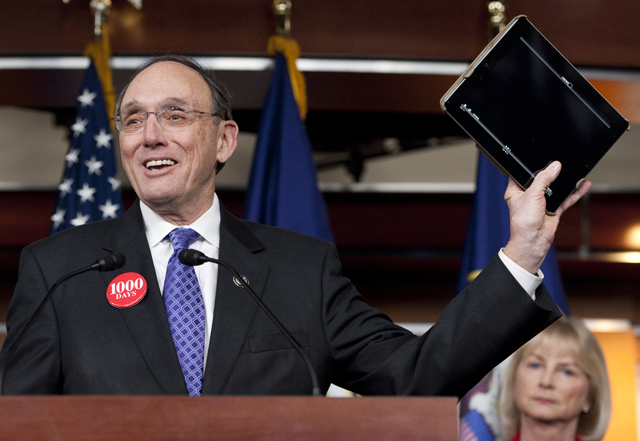RSC Health Care Reform: Another Step in the Right Direction
Nina Owcharenko Schaefer /

Rep. Phil Roe (R-TN), author of the RSC’s health reform bill. (Credit: Bill Clark/CQ Roll Call/Newscom)
The Republican Study Committee (RSC) has released its proposal to reform the health care system. The American Health Care Reform Act highlights that there is a better way to address the challenges in American health care.
The plan recommends a variety of key policy changes. Some are right on target, some offer a good start, and others need some rethinking. But overall, the proposal would get health care reform back on the right track.
Right on Target
- Repeal of Obamacare. It is far easier to wipe the slate clean by repealing the Affordable Care Act in its entirety than by trying to reform it in a piecemeal fashion.
- Provide Americans with more equitable tax relief. Today’s tax code disproportionately benefits those who have coverage through work. The above-the-line standard deduction included in the bill is not the traditional tax credit design, but it effectively functions in a similar fashion. Either approach is better suited to helping more people obtain coverage than the current patchwork system of tax breaks or a below-the-line deduction. Furthermore, it would have the same, important end result of allowing more widespread personal ownership and portability of health insurance.
- Improve the structure of health savings accounts (HSAs). HSAs offer consumers the ability to be protected from catastrophic costs while encouraging them to be prudent purchasers of medical care and also enabling them to save for future health care needs. The enhancements to HSAs included in the bill would give consumers additional flexibility to save more and use their savings to pay for their premiums.
- Offer protections to individuals maintaining continuous coverage. Individuals with group coverage are able to change coverage without facing new coverage limitations. However, that is not the case for those individuals who buy coverage on their own. Extending the group protections of these individuals would enable them to have greater portability.
- Remove barriers to interstate purchase of health insurance. The lack of competition and costly regulations and benefits at the state level can make health insurance unaffordable. The bill includes provisions enabling interstate purchase of health insurance that would give individuals more insurance options by allowing them to obtain coverage from insurers operating in other states.
- Protect the right of conscience and life of the unborn. The bill would also ensure that current federal and state conscience rights protections continue to apply to participants in the system, including patients, providers, employers, and insurers. In cases where decisions affecting medical treatment or insurance coverage involve ethical or moral considerations, individuals would be free to exercise their First Amendment rights without needing to seek protection or redress in federal court. The bill would also apply to health care reform current prohibitions on federal funding of abortion.
Further Improvements
- Expand association health plans beyond small businesses. The proposal limits association membership to small businesses. However, individual membership associations, religious groups, and fraternal organizations should also be able to sell health insurance policies through these new group purchasing arrangements. Allowing these other groups and associations to offer coverage would give individuals more—and probably more lasting—coverage options.
- Limit federal funding for high-risk pools. State high-risk pools and other risk-adjustment mechanisms can be successful tools for equitably spreading the costs of those with expensive pre-existing conditions. However, properly structured state high-risk pools or other risk-adjustment mechanisms should not burden taxpayers. The danger is that regular public funding (federal or state) of pool losses can have the undesirable effect of encouraging insurers to shift more of their costs onto taxpayers.
- Scale back the federal role in medical liability reform. The proposal correctly highlights the damage due to medical liability laws, but it oversteps the federal role. It would be more prudent to limit the scope of liability reforms to instances where the federal government has a clear, constitutionally based federal interest such as in federally funded programs like Medicare.
- Add Medicare and Medicaid reforms. The proposal does not address the growing crisis in health care entitlements, specifically Medicare and Medicaid. If there is any place that needs a strong dose of reform, it is in these government health programs. Reforms to Medicare and Medicaid would lessen government’s control over the poor and seniors and give enrollees the same advantages as the rest of Americans.
On balance, the RSC plan builds on what has made American health care unique and a step ahead of all the rest. It would reinvigorate competition based on value—that is, competition focused not only on reducing costs but also on increasing quality and benefit—and would encourage innovation. Those are the characteristics that, in the past, have led others around the world to look to America for the highest quality care.
Obamacare backers often say that there is no alternative to Obamacare. Yet again, they are wrong. The American Health Care Reform Act follows in a long line of pro-patient, pro-market health care proposals. But to get there, Congress must first stop Obamacare before it can do any more damage.
